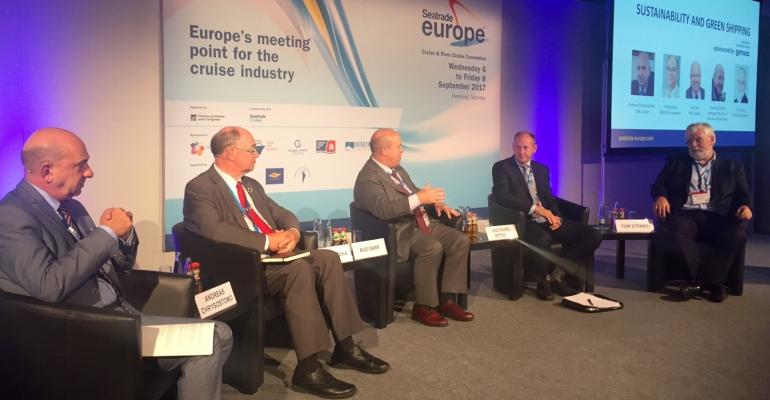'Working together we can do much more than working against each other,' Strang urged.
He called biofuels an important option for the future, and described the upcoming use of LNG 'an interesting journey to date.' At the same time, though, Strang warned the availability of new fuels for cruise ships is not where it should be.
Seatrade Europe's 'Sustainability and Green Shipping' panel, sponsored by gmec, said cruising has led the green shipping movement and continues to press for environmentally friendly advances beyond regulatory requirements.
According to Fred Danska, director - cruise business, marine solutions, Wärtsilä Corp., recent technological developments have not been huge but still contribute to significantly improving efficiency. Speaking from the suppliers' perspective, he noted operators increasingly ask for low- or zero-emission ships.
'We have experienced a shift from technology push to technology pull,' Danska said.
Outlining how the cruise business frequently leads shipping, Bud Darr, EVP maritime policy and government affairs, MSC Group, called on regulators to ensure that early adaptors of new technology are not punished by subsequent contradicting rules.
Referring to his home country, Sveinung Oftedal from the Norwegian Ministry of Climate & Environment, said green policy and, specifically, green shipping are in the forefront of Norway's politics and election campaigns. He strongly advocated for regulation at the International Maritime Organization so diverse national or regional rules won't be necessary.
Stressing the need for new fuels, Strang called for strong partnerships beyond the cruise industry to solve challenges. He advocates a knowledge transfer from other sectors such as aviation.
Differing opinions emerged when it came to shore power. While Oftedal called it important and referred to government funding in Norway—not least with regard to possible future hybrid power cruise ships, Wärtsilä's Danska dismissed shore power as a 'local greenwash' that just moves emissions away from a port.
Strang said cold ironing is 'not the silver bullet' and a complex topic that revolves around where the power actually comes from. While it could be a clean solution in some places, it's not a universal answer.
According to Strang, cruise ships can achieve good results by generating power from clean fuel or by using exhaust gas treatment systems (scrubbers). Danska said the storage and movement of energy will be the set screws for lower cruise industry emissions in the future.
In a separate Seatrade Europe session on ship design, MSC Cruises newbuilding director Trevor Young called sustainability a very important focus, demanded by both passengers and ports. Waste management, he said, is critical.
Young also pointed out that environmental and economic interests often go hand in hand. Choices that reduce energy consumption cut both operating costs and emissions. The right design and installation of cabin windows is an example.
Lars Clasen, MD of The Ritz-Carlton Yacht Collection, called sustainability a priority for every future cruise ship design.
Copyright © 2024. All rights reserved. Seatrade, a trading name of Informa Markets (UK) Limited. Add Seatrade Cruise News to your Google News feed.


